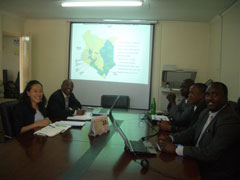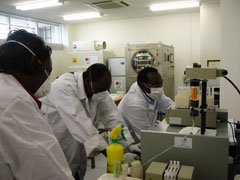Project News
2013-08-07
Greetings – One year since the project inception –

My name is Kouichi Morita, MD, PhD, the Chief Advisor of the project of the "Development of rapid diagnostics and the establishment of an alert system for outbreaks of yellow fever and Rift Valley fever in Kenya," and the Dean of the Institute of Tropical Medicine at Nagasaki University.
This project was selected as part of the SATREPS scheme in 2011. SATREPS stands for Science and Technology Research Partnership for Sustainable Development, and it is designed to promote international joint research in which Japanese research institutions and those of recipient countries to tackle global issues. Our project is carried out through collaboration of the Japan International Cooperation Agency (JICA) and Japan Science and Technology Agency (JST). The Institute of Tropical Medicine at Nagasaki University has been implementing the project with the Kenyan counterparts, the Ministry of Health (MOH) and the Kenya Medical Research Institute (KEMRI), since January 31, 2012.
In Africa, including Kenya, outbreaks of arthropod-borne virus (arbovirus), especially mosquito-borne virus, infection such as Yellow Fever and Rift Valley Fever frequently occur and cause devastating impact on humans and livestock. In addition to those impacts in Africa, outbreaks can be found even in North America, Europe and Asia caused by the spreading of arboviruses from Africa, therefore, it is getting a global issue in these days.
Most arboviruses are normally maintained in nature, such as the jungle, and when the human and livestock get infection there through mosquito bite, diseases spread and outbreaks occur among human society and farm. Vaccinations exist, but administering vaccinations to humans and livestock can be costly. Thus, early detection of cases and administering emergency vaccinations and vector control after cases are confirmed effective and more practical ways to contain the outbreaks. This approach is so-called "early containment" measures.
Our project aims to promote early detection and containment of arbovirus outbreaks through two main activities: 1. to develop and locally produce affordable point of care test kits, and 2. to establish a sustainable disease outbreak alert system model with the Government of Kenya.


One of the major characteristics of this project is the symbiotic relationship between the laboratory and social technology development activities. Each activity will take place separately, but they are complementary activities that will be jointly implemented. Relevant institutions and experts in the field have come together to realize its aims. Progresses on each activity are shared periodically between relevant experts.
For the first year of this 5-year project, and a lot of progress has been made on both laboratory and social technology development activities. For example, laboratory equipment was installed at the Production Department, Centre for Virus Research and Centre for Infectious and Parasitic Diseases Control Research (Alupe) in KEMRI and the production of antibodies for rapid diagnostic test kits such as virus antigens and antibodies were fully in progress. In addition, mobile phone SMS (short message service) based disease outbreak alert system model was designed with the Division of Disease Surveillance and Response (DDSR) at the Ministry of Health, with the help of experts from the faculty of IT at a local university called Strathmore University. Two staffs at KEMRI received training programs on virus isolations and immunochromatography diagnostic methods in Japan. At the laboratories in Kenya, local graduate students and researchers are receiving on-the-job training and the opportunities for their MSc and PhD studies through this project.
We expect that we can contribute to reduce the damage on humans and livestock from arbovirus infection through early detection and early containment of arbovirus outbreaks by the end of the project.. In addition, the technologies developed through this project could be applied to other Neglected Tropical Diseases (NTDs) in the future, in terms of development and widely utilization of the point-of-care test kits, and expanding the disease outbreak alert system model to other neighboring countries based on local needs.
Thank you for your continued support for this project.
- About JICA
- News & Features
- Countries & Regions
- Our Work
- Thematic Issues
- Types of Assistance
- Partnerships with Other Development Partners
- Climate Change / Environmental and Social Considerations
- Evaluations
- Compliance and Anti-corruption
- Science and Technology Cooperation on Global Issues
- Research
- JICA Development Studies Program / JICA Chair
- Support for the Acceptance of Foreign HRs / Multicultural and Inclusive Community
- Publications
- Investor Relations
